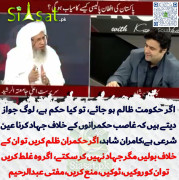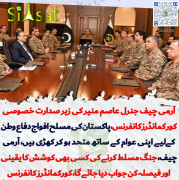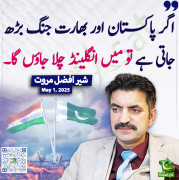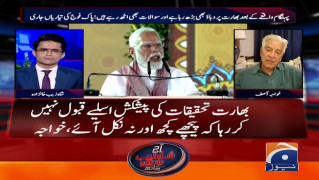Open secrets
In Pakistan, sex between men is strictly forbidden by law and religion. But even in the most conservative regions, it's also embedded in the society.
By Miranda Kennedy | July 11, 2004
LAHORE -- The first time Aziz, a lean, dark-haired 20-year-old in this bustling cultural capital, had sex with a man, he was a pretty, illiterate boy of 16. A family friend took him to his house, put on a Pakistani-made soft-porn video, and raped him. Now, says Aziz (who gives only his first name), he is "addicted" to sex with men, so he hangs around Lahore's red-light districts, getting paid a few rupees for sex. At night, he goes home to his parents and prays to Allah to forgive him.
In the Islamic Republic of Pakistan, homosexuality is not only illegal, it is a crime punishable by whipping, imprisonment, or even death. But across all classes and social groups, men have sex with men. In villages throughout the country, young boys are often forcibly "taken" by older men, starting a cycle of abuse and revenge that social activists and observers say is the common pattern of homosexual sex in Pakistan. Often these boys move to the cities and become prostitutes. Most people know it happens -- from the police to the wives of the men involved.
In some areas, homosexual sex is even tacitly accepted -- though still officially illegal -- as long as it doesn't threaten traditional marriage. In the Northwest Frontier Province (NWFP), which shares many tribal and cultural links with neighboring Afghanistan, the ethnic Pashtun men who dominate the region are renowned for taking young boys as lovers. No one has been executed for sodomy in Pakistan's recent history, but across the border in Afghanistan, the Taliban (who are also overwhelmingly Pashtun) executed three men for sodomy in 1998 by bulldozing a brick wall over them, burying two of them alive. (The third survived, which meant, according to Taliban law, that he was innocent, so he was taken to a hospital for treatment.)
Among Pakistan's urban elite, there is a growing community of men who identify as gay, some of whom even come out to their friends. Men meet on Internet bulletin boards, or at private pool parties with lots of rented boys and heavy security. But they are a tiny, terrified minority, living in cities such as Lahore, Karachi, or Islamabad, where the cultural elite has carved out a niche for itself. In a country where alcohol is forbidden except to Christians, dancing is banned, and the Koran guides many aspects of criminal law, such men rarely step outside of their protected world. (Because women in Pakistan inhabit, for the most part, a strictly private realm, it is difficult to say with any certainty how common lesbian relationships may be.)
Homosexuals in Pakistan walk a fine line between harsh legal and cultural prohibition and some form of unspoken social acceptance. "Islamic tradition frowns on but acknowledges male-male sex, and this plays a role in permitting clandestine sex so long as it is not allowed to interfere with family life, which is of paramount importance," the San Francisco-based sociologist Stephen O. Murray writes in "Sociolegal Control of Homosexuality: A Multi-Nation Comparison," a collection of scholarly essays published in 1997. Further complicating matters, the most common form of male homosexuality in Pakistan, according to Murray, is pederasty, where an older man entices or coerces (sometimes forcibly) a younger boy into sex.
Among the many obstacles facing men who have sex with men in Pakistan is this close association, in the eyes of many Pakistanis, between homosexuality and exploitation. But they face their own psychological barriers as well. Of the dozens of men interviewed for this article, almost none who admitted to having homosexual sex identified themselves as "gay." (All would give only their first names, which could not be verified, or would speak only anonymously.) Most do not even believe that homosexuality should be legal.
Aziz says he now enjoys sex with other men, but he believes that's only because he isn't able to have sex with women, who are largely inaccessible -- even in red-light districts, where there are many more men than women for rent. And like most Pakistani men who have homosexual sex, Aziz believes it is wrong. "The Verses of the Koran do not allow it," he says. "That's the only thing that matters."
. . .
According to the Koran, when the prophet Lot saw that his people had been engaged in sodomy and debauchery, he said, "Come ye to men, instead of women, lustfully? Ye are indeed a people given to excess." When they refused to repent their sins, Allah destroyed them: "And we rained a rain upon them: and see what was the end of the wicked!"
The lines don't seem to leave much room for interpretation. But Faisal Alam, founder of the Al-Fatiha Foundation, a Washington-based organization for gay and lesbian Muslims, argues that Lot's people were killed not because they had homosexual sex, but because they were forcing sex on each other. That interpretation is unlikely to hold much weight with Pakistan's religious leaders. The matter is not open for debate here -- not among mullahs, academics, or even activists.
Like many Pakistani men who have sex with men, Aziz believes he is plagued by a "satan," or demon, that makes him desire men. Veteran human rights lawyer Hina Jilani, who lives in Lahore and specializes in women's rights cases, says the inconsistent application of Sharia (Islamic law) and Pakistani criminal law has blurred the line between abuse and gay sex, and the emphasis on Islamic values has imbued the very word "homosexuality" with a moral color.
"Here we have two totally different issues: exploited boys and sex workers versus consensual sex," Jilani says. "But the majority of people will think of them as the same. Even people like myself who do understand this issue haven't been able to take it up, except in the context of violence against people on basis of sex orientation."Jilani says there are innumerable cases of young boys -- some sex workers, some not -- charged under Pakistan's sodomy law, even if they have been enticed into sex.
Jilani, who has defended dozens of children accused under the law, says they spend long years in jail awaiting trial; their families are stigmatized and often forced to disown them. In most parts of Pakistan, it's easier to lure a boy into sex than it is to catch a glimpse of a woman's legs. Sometimes it doesn't take more than the promise of a new cricket bat.
A 16-year-old who identifies himself only as Khurram knows all about that. Born in Dina, a small city in central Pakistan, his father died when he was young, and by the time he was 8 he was sent out to support his family. He says his employer sexually assaulted him, and he eventually realized that if he let it happen, he would make more money than he would serving chai. So he moved to the big city. Now he lives beside the bus stand in Rawalpindi, sleeping during the day and emerging at dusk to wait for work. For less than a dollar, he'll let a man have sex with him on a string bed behind a tobacco shop. "I don't like what I do," he says sorrowfully. "I am doing it so my sister can go to school."
. . .
There are no discernible red-light districts in the Northwest Frontier Province. In Peshawar, the provincial capital, women billow through the dusty streets in white "shuttlecock" burkas, named for the netted veil over the face. Many of the city's movie theaters have been shut down, and playing music in local buses is banned.
Ruled by an alliance of six Islamic parties who recently declared Sharia to be supreme over Pakistani national law, the NWFP is one of the most religiously conservative regions of Pakistan. This is the province that helped give rise to the Taliban, and where Al Qaeda leaders -- including Osama bin Laden -- continue to seek refuge, according to the Pakistani government.
Yet this is also the region of Pakistan where homosexuality is most tolerated -- however quietly. Among the Pashtun majority, having a young, attractive boyfriend is a symbol of prestige and wealth for affluent middle-aged men. Indeed, Pashtun men often keep a young boy in their hujra, the male room of the house that the wife rarely enters. The practice is so common that there are various slang terms for the boyfriends in different regional languages: larke (boy), warkai, alec.
According to many people interviewed in Peshawar, there's a strict code of behavior in these relationships. The boy is always the passive partner in sex and has often been coerced into the relationship; he is given food and clothes by his partner, and is in may cases forbidden to leave the relationship or marry. (In theory, the boys could marry when they're grown, but they are generally considered damaged, and end up wandering the streets as outcasts.)
Sayed Mudassir Shah, a human rights activist based in Peshawar, believes this goes on in part because of the extreme austerity of the traditional culture. Even after marriage, women are kept separate from men (except at night), and a strict interpretation of Islam discourages sports, music, and TV. Indeed, says Sayed, the practice is deeply embedded in the local culture. "It is so common to take boy lovers, that it is part of our Pashtun folklore," Sayed says. "One story tells of a wife crying to her husband that he has made her jealous, because he is spending so much time in the hujra with his boyfriend. This is folklore, but it is similar in life."
Sex between men is also commonplace in Pakistan's gender-segregated madrassas, or religious schools, where students and mullahs will go for months without setting eyes on a woman. Here, more than anywhere else in Pakistan, the situation resembles that found among prison inmates, where sex is mostly about availability and dominance rather than preference. In many cases, families take their sons to madrassas because they cannot afford to raise them themselves. A researcher with the AIDS Prevention Association of Pakistan (who asked that her name not be used) cited a saying such parents have for the teachers when they bring them their sons: "His flesh is yours, but his bones are ours."
. . .
A spirited, self-confident young man of 25 who lives in Islamabad, the nation's capital, and identifies himself only as Sajat, tells me that he first had sex with a man at a religious school in a central Pakistani village. But unlike most madrassa students and the boys in the red-light districts, Sajat's first sexual encounter with a man was by choice. Now a well-paid government servant in Islamabad, he hoots with laughter when he describes his preference for young, "hot-blooded, fighting soldier men," and happily recounts his regular trawls for boys through Islamabad's parks.
But Sajat's irreverent, openly gay self abruptly disappears when marriage comes up. He admits that he is engaged to a match of his parents' choosing, and will marry in the next two years. "Nature has made females for males, so after I get married, I will stop having sex with men," he intones, as though dutifully.
Indeed, gay men in Pakistan usually succumb to family pressure to marry, and those who are brave or rich enough to refuse to marry live under constant threat. Human rights workers say that the dearth of Pakistani gay-rights or community groups heightens the isolation and fear of those who identify -- and live -- as homosexuals. There are groups working against the spread of AIDS in Pakistan, but their work is often impeded by the cultural disapproval of homosexual sex.
Haji Muhammad Hanif, the general secretary of the AIDS Prevention Association of Pakistan, says that when he talks to male sex workers in the red-light districts of Lahore, he first asks them, "Do you know that gay sex is a heinous crime?" According to Pakistan's official figures, there were only some 2,000 cases of AIDS in Pakistan as of June 2003, but data collection is limited by social taboos. Estimates by the World Health Organization and UNAIDS put the 2002 figure at 78,000.
One bright spot for gay men in Pakistan is the Internet. There are several online bulletin boards that function as city-specific dating sites for gay men. The men who advertise on the sites are generally blunt about what they want: "Masculine Top looking for hot sex in Islamabad," runs a typical listing. One site, Pakistan Gays, tries to be more of a resource, with articles about homosexuality, health advice, and an anonymous question-answer service. There's even an audio version of sections of the Koran available for download, which shows the extent to which gay men in Pakistan hold onto their Muslim identity.
Pakistan Gays was founded two years ago by a middle-class accounting student in Lahore who spoke with me only on the condition of anonymity. He runs the site from Internet cafes so his family won't find out. As of June, the site had signed up 569 Pakistani members. Of those who registered, 302 identified themselves as gay, 241 as bisexual, and the rest as "transgender."
The website's founder is 20, and identifies as gay. He says he is in love with an Indian man he met over the Internet, but he harbors no hope of living in a gay relationship in either Pakistan or India, where homosexuality is also illegal and tolerance of gays is not much greater than in Pakistan. His plan is to refuse his parents' demands that he marry, and emigrate to the West with his Indian lover.
"It is difficult to be homosexual in Pakistan," he says, "because you always fear that if the people around you knew about your sexuality, what bad feelings they would have about you. We think that we are born this way, but still we feel we are doing wrong."


































